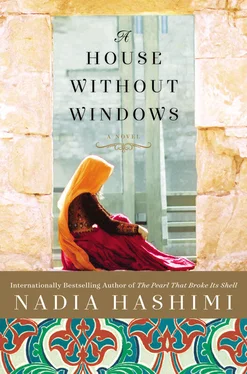“I can’t believe we’re actually considering this. Tell me, what happens if she is deemed crazy?” the prosecutor asked.
Gulnaz looked at the judge and spoke before he could.
“But this is wrong. Let her go to a hospital. My father would tell you what some of those mullahs do in the name of treatment is un-Islamic.”
The judge met Gulnaz’s eyes and felt the moisture of his palms again, the tickle at the back of his neck.
“The mullah is a remarkable healer and I trust his assessment. Zeba would be in good hands.”
“And if she is crazy and he is able to heal her, then she can be tried and found guilty. Fine. You can let me know when you want to reconvene,” the prosecutor said impatiently. “Whether it’s today or next month, Zeba will be found guilty.”
Yusuf and the prosecutor stood. Gulnaz picked her handbag off the floor and brought the strap over her arm. The judge felt his face warm to watch her, as if he’d spied her slipping a dress over her bare shoulder instead.
Did a man ever grow too gray and wrinkled to have such thoughts? He was helpless.
Qazi Najeeb picked up his tasbeh and began thumbing; the beads felt cool and reassuring against his clammy palm. He would think of her later, he knew, when he met his wife’s dull eyes and ready scowl. How different his story would have been, he thought, had Gulnaz become his bride all those years ago. They would have been content as husband and wife. She, the daughter of a respected murshid and he, the ambitious son of a hardworking man. The judge uncrossed his legs and stole a glance at the clock on the wall, the second hand ticking ever forward. There was no way to go back in time.
Despite all his efforts, there wasn’t much justice in this world.
“RAISINS, WALNUTS, ALMONDS! THE RAISINS ARE GOOD FOR YOUR diabetes, the walnuts will cure rheumatism, and the almonds will cool your wife’s temper! Pine nuts, roasted chickpeas, and dried apricots! Pine nuts so fresh you’ll be knocking on my door in the middle of the night asking for more!”
Walid’s throat felt gritty. He coughed a bit and took a sip of water from a crumpled plastic bottle he kept tucked next to the bags of walnuts. He shouted the same pitch he’d been using for years, and it no longer drew the smiles it once had. People didn’t chuckle or make conversation. It seemed everyone was too tired for any of that anymore.
Walid walked in a cloud of dust, spun into the air by the wheels of his cart and a light wind coming down from the mountains to the west. He was nearing their block for the third time today. Usually, he only passed through a street once.
“Ramadan is coming! Don’t go hungry a day before you’re supposed to!”
Two school-age boys raced by him, passing an underinflated soccer ball back and forth. Walid brought his sleeve to his nose and mouth. He’d always had bad lungs. His mother told him it was because she’d been caught in one of the worst dust storms in history while she was pregnant with him. He’d grown accustomed to feeling like he was sucking air through a straw, but today was particularly hard.
He set his cart down and placed his hands squarely on his hips. He was in front of their house. Where was the little girl? Was she in school? Was she just a few feet away from — close enough to hear him call?
Walid coughed and felt something loosen in his chest. The dust settled a bit, and he took a long breath through pursed lips.
Why had he, a wheezing street vendor, been charged to hold her secrets? He could barely feed his own family. He was a man of faults. He had gossiped and cursed. He had been short-tempered with his wife and children. He had done nothing when his sister begged him to talk to her abusive husband on her behalf. He had cheated nearly everyone in the village at one time or another, charging some more than others when he didn’t like the way they looked at him or if they hadn’t purchased anything from him in a long time. He lied about where his walnuts came from and how fresh they were. When he’d found maggots crawling between them, he’d simply plucked the intruders out and returned the lot to the cart, thinking of the many hungry bellies waiting on his return at home. He prayed and taught his children to do the same. He was not a very learned man and feared his family suffered for it. He was nothing of use.
His wife cried at times, heartbroken for a girl she’d never met. The girl was not their child. Why should they bother themselves with this? Had they not enough to worry about under their small, patchwork roof?
“Raisins, golden ones the color of a pari ’s hair and just as enticing! Green ones so perfect your husband will forget his troubles! Black ones to give you the figure of a movie star!”
His voice was raspy. He’d thought of bringing one of his children with him. If he could teach his son to sound the call into the streets, he could save his breath for pushing the cart around. But the boy was young yet, and Walid wanted him to go to school. If they could read and write, they might stand a chance, and he would need them to care for him in his old age, which seemed to be fast approaching. Judgment Day.
Walid would have much to answer for on Judgment Day. What would the most righteous person do with this? Could he do better than standing outside the poor girl’s door and reminding her of the raisins that had ruined her?
He would stay away from this block. He would never hawk his raisins or nuts on this street again. He would lower his voice even one block away so she wouldn’t be tortured by his ridiculous chants. He would leave the poor girl in peace. It wouldn’t be great, but it would be better.
Walid heard the creak of metal behind him.
He should have rejoiced. He’d spent years walking up and down these streets, hoping to hear that creak, the sign that he would sell a sack of walnuts or a half kilo of raisins. He would laugh and smile and watch walnuts tumble into a brown paper bag. He would take a few bills and know that there would be rice, tomatoes, and onions for tomorrow or the day after. He would have a reason to wake up in the morning and bring his goods through the streets again. The sound of a door opening was, usually, a blessing.
He knew, without looking, that someone stood in that doorway. Someone was staring at his back and waiting for him to turn around.
The door scraped again, slowly and deliberately. Walid breathed a sigh of relief to hear it close. He’d been released. There would not be a conversation today, and he had promised himself a thousand times, in the few weighted seconds that had just passed, that he would never dare to roll his cart down this block again.
Walid picked up the handles of his cart, his shoulder blades pulling together with resolve. Leave the family to their private matters, he told himself. It was the only respectable thing to do. His wife would understand. She would stop looking from their daughters to him with those dark, castigating eyes.
The wheels had not yet made one full rotation before Walid was stopped short.
“Agha- sahib, don’t go.”
He took a deep breath and turned around. The metal door wasn’t closed at all. It was open, so narrowly that Walid could not see the speaker’s face but wide enough that a mother’s heart could spill its caged sorrows into the unpaved street.
YUSUF FELT THE CAR’S SUSPENSION STRUGGLE WITH THE ROUGH road. With every jostle, he was further convinced that coming to the shrine was an even worse idea than he’d originally thought.
The car had puttered down the long dirt road leading to a small one-story clay-and-mud building with blue window frames and an arched doorway. A man emerged just as they parked the car.
Читать дальше











